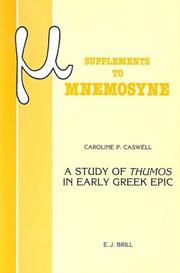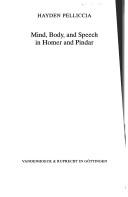| Listing 1 - 8 of 8 |
Sort by
|
Book
ISBN: 284174342X 9782841743421 Year: 2004 Volume: *47 Publisher: Paris: Kimé,
Abstract | Keywords | Export | Availability | Bookmark
 Loading...
Loading...Choose an application
- Reference Manager
- EndNote
- RefWorks (Direct export to RefWorks)
Dans leur conception du psychisme, les Grecs ont accordé à l'impétuosité de l'âme (thumos) une place considérable. Homère fut, en ce domaine, un pionnier. C'est en cheminant à travers l'histoire complexe et sinueuse du thumos - Hésiode, Pindare, les auteurs tragiques, les philosophes préplatoniciens - qu'il devient possible de mieux discerner le rôle entièrement nouveau que joue cette impétuosité psychique - tantôt partie de l'âme, tantôt attribut de l'âme - dans la démarche platonicienne.
Philosophy, Ancient --- Thymos (The Greek word) --- Philosophie ancienne --- Thumos (Le mot grec) --- Plato --- Platonists --- Soul --- Plato.
Book
ISBN: 1282897780 9786612897788 0231518366 9781282897786 9780231518369 Year: 2010 Publisher: New York : Columbia University Press,
Abstract | Keywords | Export | Availability | Bookmark
 Loading...
Loading...Choose an application
- Reference Manager
- EndNote
- RefWorks (Direct export to RefWorks)
While ancient civilizations worshipped strong, active emotions, modern societies have favored more peaceful attitudes, especially within the democratic process. We have largely forgotten the struggle to make use of thymos, the part of the soul that, following Plato, contains spirit, pride, and indignation. Rather, Christianity and psychoanalysis have promoted mutual understanding to overcome conflict. Through unique examples, Peter Sloterdijk, the preeminent posthumanist, argues exactly the opposite, showing how the history of Western civilization can be read as a suppression and return o
Anger. --- Anger --- Thymos (The Greek word) --- Political science --- Capitalism --- Religious aspects --- Christianity. --- Judaism. --- Philosophy.

ISBN: 9004092609 9004329102 9789004092600 9789004329102 Year: 1990 Volume: 114 Publisher: Leiden: Brill,
Abstract | Keywords | Export | Availability | Bookmark
 Loading...
Loading...Choose an application
- Reference Manager
- EndNote
- RefWorks (Direct export to RefWorks)
The language of early Greek epic, exemplified primarily by Homer, contains numerous descriptions of inner states and uses a specific vocabulary to do so. Scholars understand these descriptions in a general way; but the precision of the expressions remains a mystery. In this work, one of the most important of these words, thumos , is examined in each of its contexts. This synchronic formulaic analysis is carried out according to the contexts of thumos : the cognitive/intellectual, the emotional, and the physical. Two additional contexts, deliberation and motivation, are discussed separately. Within the discussion of each context, the functional synonyms of thumos, particulary phren/phrenes , and other frequent associates of thumos , are examined. Thumos has associations with words relating to winds and storms, a fact which helps clarify its significance in all contexts. Because this work is a discussion of thumos in all contexts, and also contains an appendix of the relevant passages, it should be useful to scholars engaged in research on Homeric vocabulary.
Lexicology. Semantics --- Classical Greek language --- Thumos (Grieks woord) --- Thumos (Mot grec) --- Thumos (The Greek word) --- Epic poetry, Greek --- Thymos (The Greek word) --- Poésie épique grecque --- Thumos (Le mot grec) --- History and criticism. --- Histoire et critique --- -Thymos (The Greek word) --- Greek language --- Greek epic poetry --- Epic poetry, Classical --- Greek poetry --- History and criticism --- Etymology --- Thymos (The Greek word). --- Poésie épique grecque --- Epic poetry, Greek. --- Epic poetry, Greek - History and criticism.
Book
ISSN: 01530828 ISBN: 9782711625307 2711625303 Year: 2014 Volume: 45 Publisher: Paris: Vrin,
Abstract | Keywords | Export | Availability | Bookmark
 Loading...
Loading...Choose an application
- Reference Manager
- EndNote
- RefWorks (Direct export to RefWorks)
Cette etude repond a la question de savoir ce qui dans l'ame individuelle et collective doit etre eduque et par quels moyens. Platon etablit une psychologie morale et politique en prenant soin de cerner un intermediaire, le thymos, entre la raison et le desir.
Emotions (Philosophy) --- Thymos (The Greek word) --- Emotions (Philosophie) --- Thumos (Le mot grec) --- Plato --- Emotions (philosophie) --- Thumos (le mot grec) --- Platon, --- Critique et interpretation --- Plato.
Book
ISBN: 3518418408 9783518418406 Year: 2006 Publisher: Frankfurt am Main: Suhrkamp,
Abstract | Keywords | Export | Availability | Bookmark
 Loading...
Loading...Choose an application
- Reference Manager
- EndNote
- RefWorks (Direct export to RefWorks)
Anger --- Anger. --- Capitalism --- Political science --- Thymos (The Greek word) --- Religious aspects --- Christianity. --- Judaism. --- Philosophy. --- Thymos (The Greek word). --- Indignation --- Madness --- Wrath --- Rage --- Emotions --- Temper --- Thumos (The Greek word) --- Greek language --- Political philosophy --- Religious aspects&delete& --- Christianity --- Judaism --- Philosophy --- Etymology --- Deadly sins
Book
ISBN: 9780231145220 9780231518369 Year: 2010 Publisher: New York, N.Y. Columbia University Press
Abstract | Keywords | Export | Availability | Bookmark
 Loading...
Loading...Choose an application
- Reference Manager
- EndNote
- RefWorks (Direct export to RefWorks)
Philosophy and psychology of culture --- Anger --- Capitalism --- Political science --- Thymos (The Greek word) --- Indignation --- Madness --- Wrath --- Rage --- Emotions --- Temper --- Thumos (The Greek word) --- Greek language --- Political philosophy --- Religious aspects&delete& --- Christianity --- Judaism --- Philosophy --- Etymology --- Religious aspects --- Deadly sins
Book
ISBN: 9783631535202 3631535201 Year: 2008 Volume: 95. Publisher: Frankfurt am Main [etc.] Peter Lang
Abstract | Keywords | Export | Availability | Bookmark
 Loading...
Loading...Choose an application
- Reference Manager
- EndNote
- RefWorks (Direct export to RefWorks)
Ethics, Ancient --- Psychology --- Thought and thinking --- Act (Philosophy) --- Morale ancienne --- Psychologie --- Pensée --- Action (Philosophie) --- History --- Histoire --- Plato. --- Pensée --- Thymos (The Greek word) --- Thumos (The Greek word) --- Greek language --- Ancient ethics --- Etymology --- Plato --- Aflāṭūn --- Aplaton --- Bolatu --- Platon, --- Platonas --- Platone --- Po-la-tʻu --- Pʻŭllatʻo --- Pʻŭllatʻon --- Pʻuratʻon --- Πλάτων --- אפלטון --- פלאטא --- פלאטאן --- פלאטו --- أفلاطون --- 柏拉圖 --- 플라톤 --- Language. --- Platon --- Platoon --- Платон --- プラトン

ISBN: 3525252072 9783525252079 Year: 1995 Volume: 107 Publisher: Göttingen: Vandenhoeck und Ruprecht,
Abstract | Keywords | Export | Availability | Bookmark
 Loading...
Loading...Choose an application
- Reference Manager
- EndNote
- RefWorks (Direct export to RefWorks)
Metafoor --- Metaphor --- Métaphore --- Organen (Anatomie) in de literatuur --- Organes (Anatomie) dans la littérature --- Organs (Anatomy) in literature --- Parabole --- Thumos (Grieks woord) --- Thumos (Mot grec) --- Thumos (The Greek word) --- Homer --- Pindar --- Criticism and interpretation --- Critique et interprétation --- Greek poetry --- Mind and body in literature. --- Body, Human, in literature. --- Thymos (The Greek word) --- Speech in literature. --- Heart in literature. --- Metaphor. --- History and criticism. --- Human body in literature. --- Thymos (The Greek word). --- Spraak. --- Lichaam en geest. --- Innerer Monolog. --- Esprit et corps --- Thumos (le mot grec). --- Greek poetry. --- Style, Literary. --- Dans la littérature. --- Pindarus. --- Homerus. --- Homère, --- Pindare, --- Homer. --- Pindar. --- Literary style. --- Critique et interprétation. --- Language. --- Body, Human, in literature --- -Heart in literature --- Mind and body in literature --- Speech in literature --- History and criticism --- -Pindar --- -Literary style --- Literary style --- Greek language --- Figures of speech --- Reification --- Greek literature --- Human figure in literature --- Etymology --- -Pindarus --- Pindare --- Pindaro --- Πίνδαρος --- Hóiméar --- Hūmīrūs --- Homeros --- Homerus --- Gomer --- Omir --- Omer --- Omero --- Ho-ma --- Homa --- Homérosz --- האמער --- הומירוס --- הומר --- הומרוס --- هومر --- هوميروس --- 荷马 --- Ὅμηρος --- Гамэр --- Hamėr --- Омир --- Homero --- 호메로스 --- Homerosŭ --- Homērs --- Homeras --- Хомер --- ホメーロス --- ホメロス --- Гомер --- Homeri --- Hema --- Pseudo-Homer --- Pseudo Omero --- Píndaro --- Pindaros --- Homère --- Critique et interprétation --- Heart in literature --- Human body in literature --- Pindarus --- Technique --- Criticism and interpretation. --- Greek poetry - History and criticism.
| Listing 1 - 8 of 8 |
Sort by
|

 Search
Search Feedback
Feedback About UniCat
About UniCat  Help
Help News
News